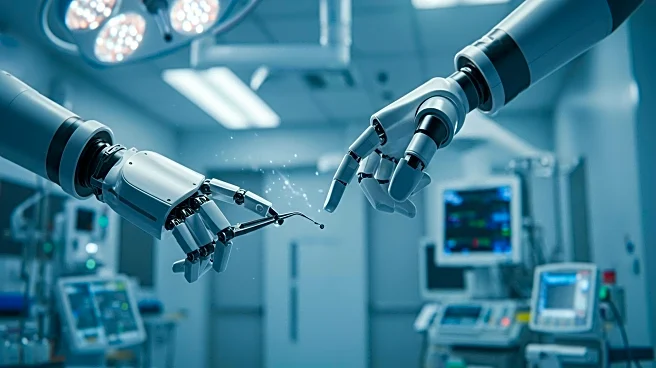What is the story about?
What's Happening?
AI and robotics are increasingly being integrated into healthcare, revolutionizing patient care and hospital operations. These technologies are enhancing diagnostic accuracy, surgical precision, and overall hospital efficiency. Robotic-assisted surgeries are becoming more common, offering greater precision and reduced recovery times for patients. AI-powered systems are also helping to minimize medical errors by assisting doctors in decision-making processes. Additionally, robots are being used in various hospital roles, such as delivering medications, supporting patient rehabilitation, and disinfecting hospital spaces. The global healthcare robotics market is projected to surpass $20 billion by 2025, driven by the adoption of surgical robots and automated assistance in over 70% of hospitals in developed countries.
Why It's Important?
The integration of AI and robotics in healthcare is significant as it promises to improve patient outcomes and hospital efficiency. By reducing human error and enhancing surgical precision, these technologies can lead to fewer complications and faster patient recovery. The use of robotics in healthcare also addresses the growing demand for medical services, especially in rural or underserved areas, by enabling telemedicine and remote consultations. However, the adoption of these technologies also presents challenges, including high implementation costs, technical complexity, and ethical concerns regarding patient trust and data privacy. Addressing these challenges is crucial for ensuring equitable access to advanced healthcare technologies.
What's Next?
As healthcare robotics continues to evolve, the focus will likely be on overcoming the challenges of cost, technical complexity, and ethical concerns. Healthcare providers may need to invest in training and infrastructure to fully integrate these technologies into their operations. Policymakers and industry leaders will also need to address data privacy and ethical issues to build trust in robotic healthcare solutions. The future of healthcare may see a collaborative approach where human expertise and intelligent machines work together to enhance patient care and outcomes.
Beyond the Headlines
The rise of healthcare robotics also raises important ethical and cultural questions about the role of technology in patient care. As robots take on more responsibilities traditionally held by human caregivers, there is a need to consider the impact on patient trust and the human element of care. Additionally, the concentration of advanced robotics in wealthier countries highlights a global healthcare gap, emphasizing the need for strategies to ensure equitable access to these technologies worldwide.















